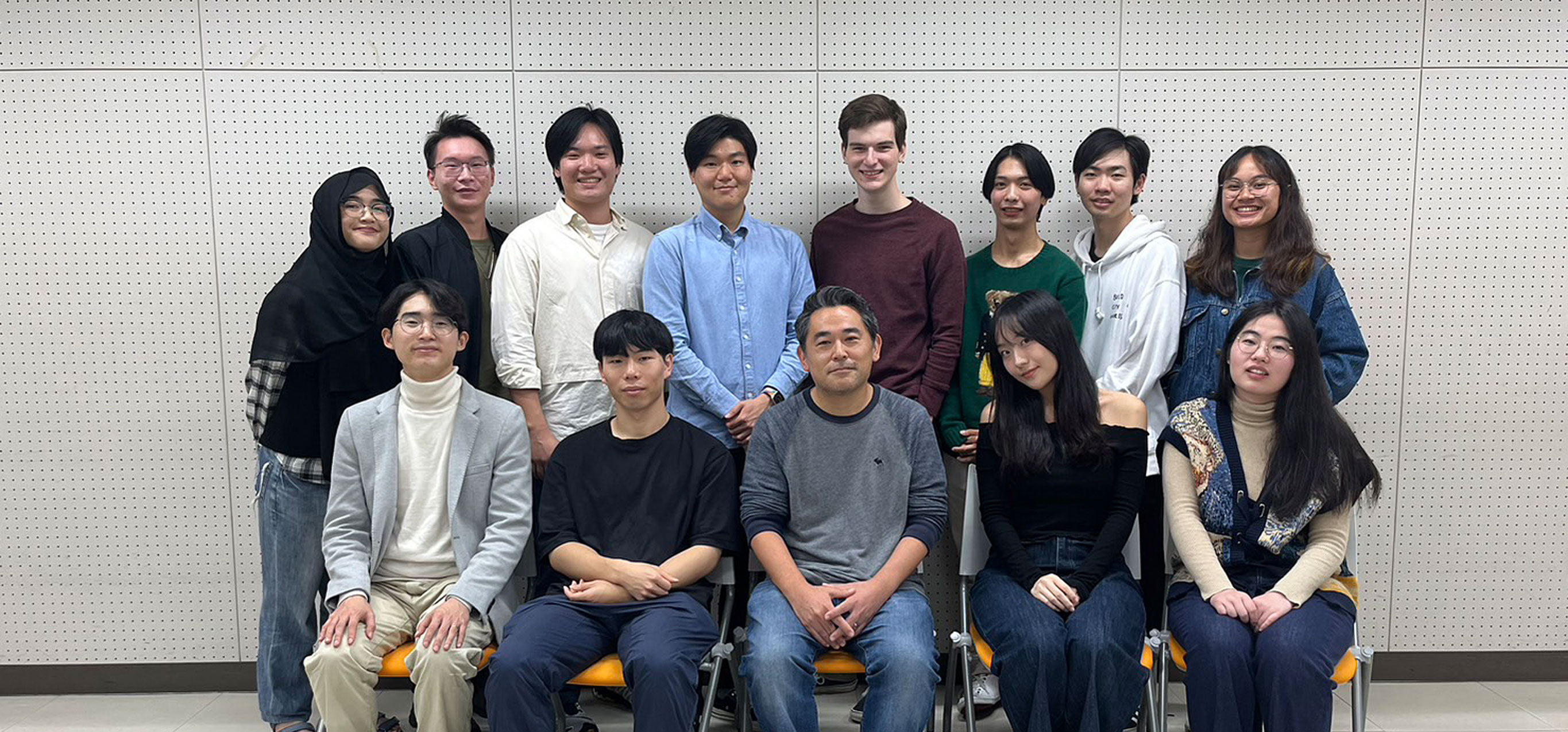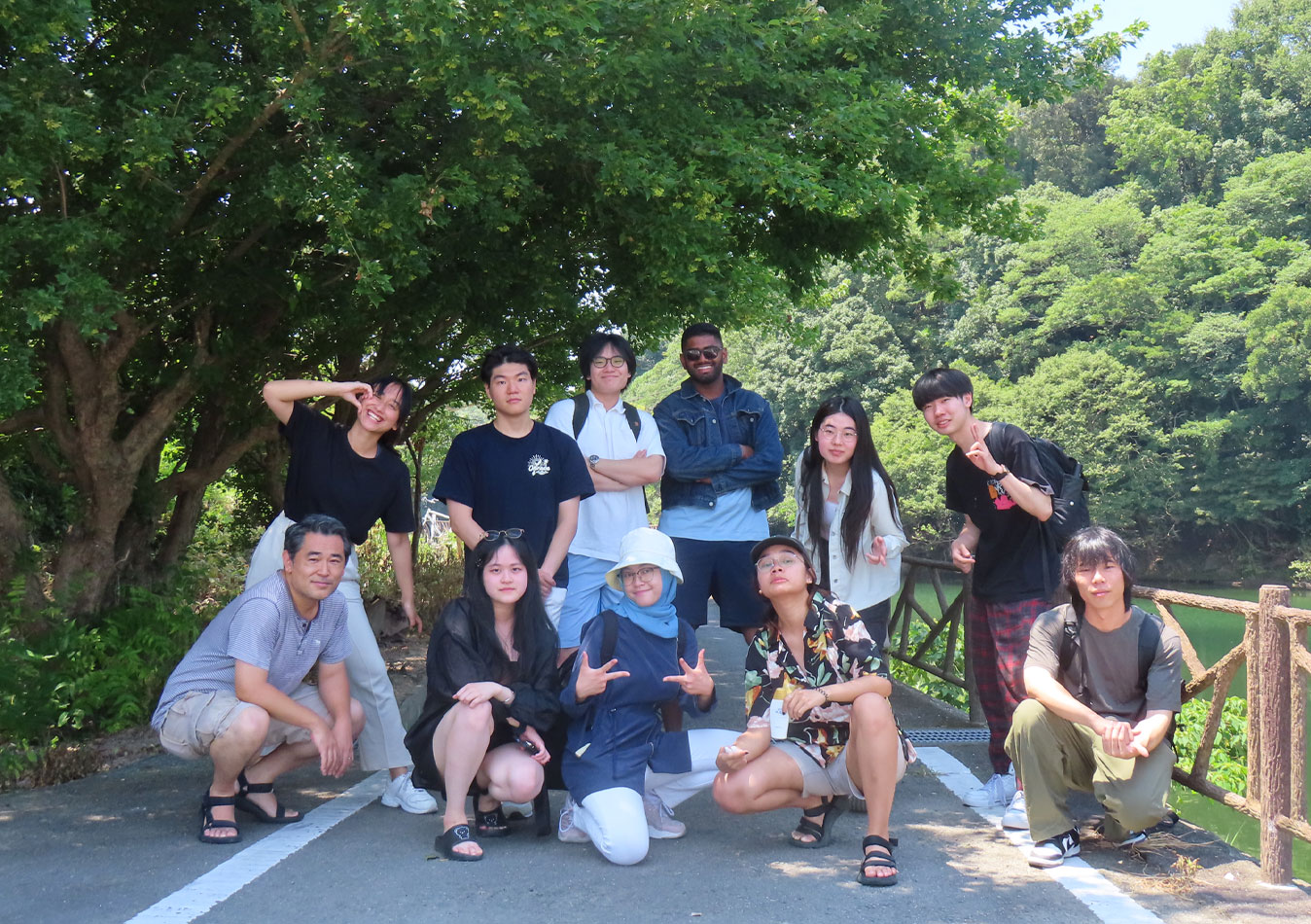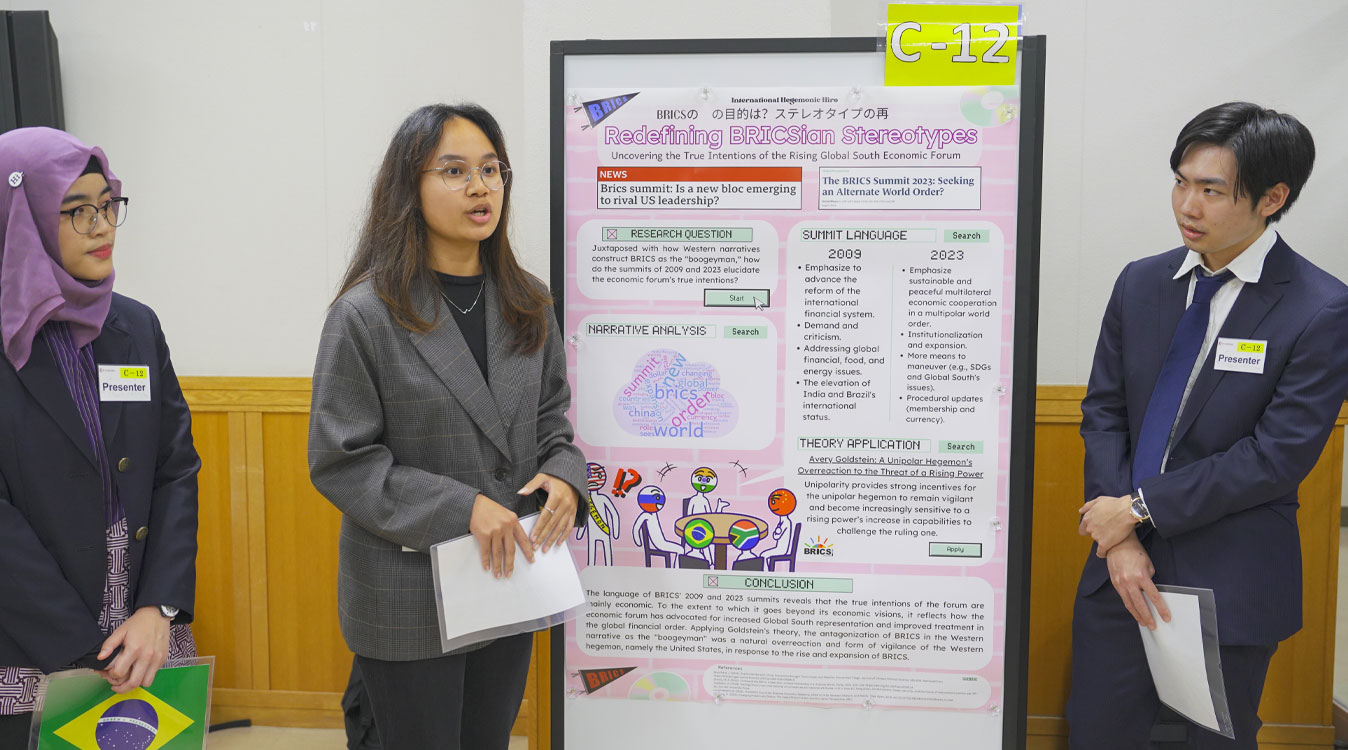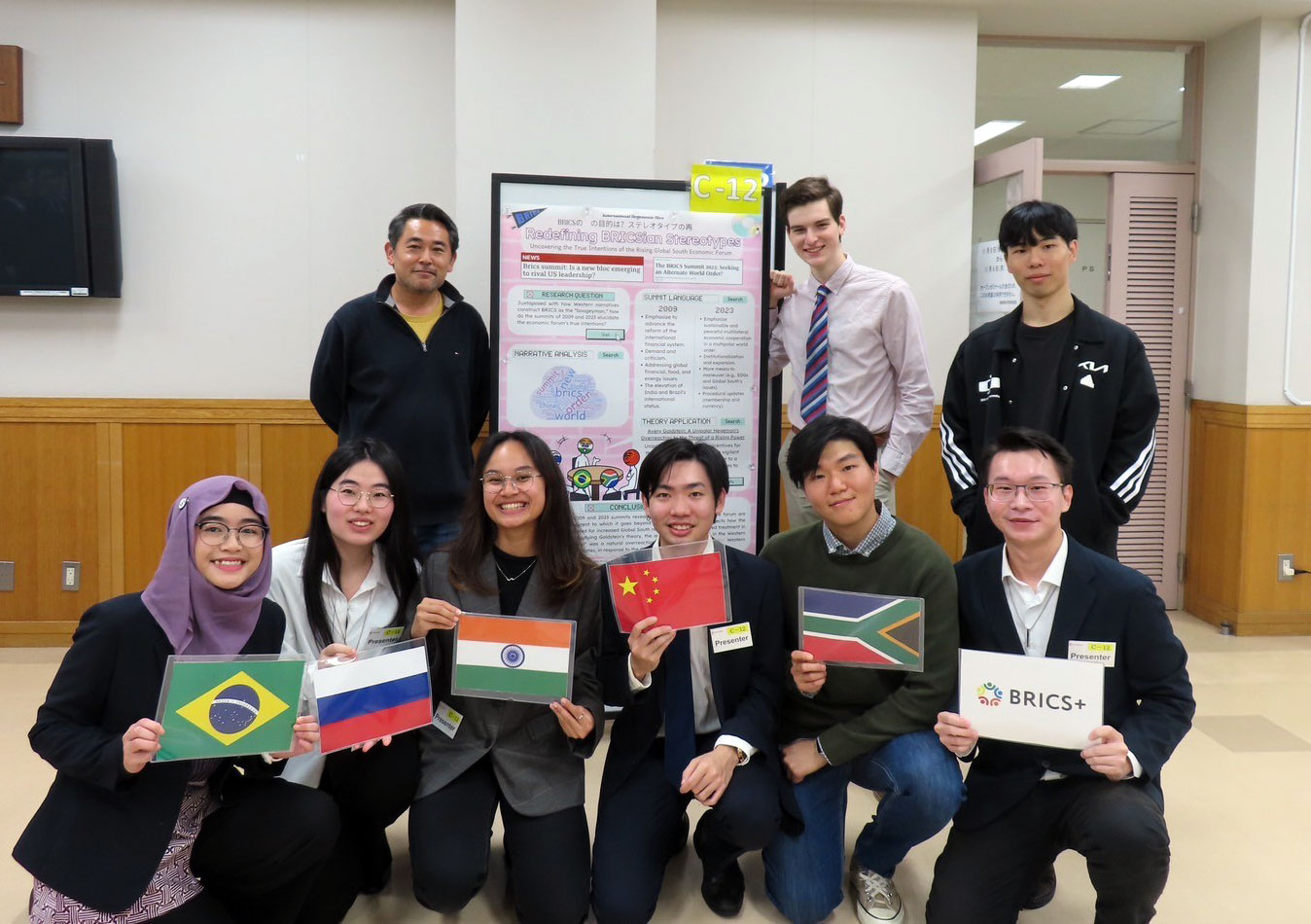
Zemi Research Convention 2023 “Redefining BRICS Stereotypes : Uncovering the True Intentions of the Rising Global South Economic Forum”
Ataka Seminar (team name: International Hegemonic Hiro)
IVAN Dwi Gunawan, TAKAHASHI Ryo, UMEHARA Harunori, KAMIMURA Kotaro, MAHONI Anjani Putri, Mutiara Nadine ANDREAPUTRI, ZHANG Shuyu, LEE Jungeun, JUNG Haebin, CARDY Bryce, PYO Ye-Chan
We interviewed the members of the Ataka seminar (Professor ATAKA Hiroaki), who presented "Redefining BRICS Stereotypes : Uncovering the True Intentions of the Rising Global South Economic Forum" at the Zemi Research Convention 2023.
Please let us know about your seminar.
In this seminar, we mainly look at different issues and discussions in the field of International Relations through a Critical IR theories lens. Typically, our seminar collectively picks out a specific theme through collections of journals, then researches and presents the selected articles in class, followed by discussions. Last semester, we focused on the topic of Order and Justice, which covered the idea of attaining order and justice in international relations and how justice is a very contested concept as it is different in every society. This semester, we are looking into Asian conceptions of international order. Thinking of new possibilities and scopes beyond the current Liberal International Order, the journal that we are focusing on looks at Asian conceptions of international order through ten different Asian countries.
Every semester, we have a Research Methods Workshop, where we are paired or grouped with the students in our respective batch to present each other's research progress. The workshop allows us to ensure our comprehension of our research through other students' ability to understand and present our research. The Question-and-Answer sessions after every presentation also allow increased feedback from our peers and the professor. Every fall semester, we participate in the Zemi Research Convention and begin our preparation at the end of the previous spring semester.
Please let us know about your instructor.
Ataka-sensei is the perfect instructor when it comes to critical IR. He provides essential and insightful foundations to critically examine various issues in IR, like the world order, environment, development, religion, and conflicts. He provides support and guidance in constructing and conducting our research for our graduation thesis. He is very accommodating when it comes to his students' contributions to discussions. He always validates and makes sense of our opinions during discussions, even when we struggle to articulate our points clearly. Moreover, Ataka-sensei is a friendly and supportive instructor who goes out of his way to connect with his students.

What activities did you do at the Zemi Camp in summer?
Other than strengthening the bond among Zemi members and sending off our graduating senpais, the goal that we aimed to do during the Zemi Camp was to prepare for the Zemi Research Convention. We had a thorough discussion on the topic for the convention and the task distribution in researching and creating the poster for the convention.
Please give details of your Zemi Research Convention presentation.
Our presentation was titled Redefining BRICSian Stereotypes: Uncovering the True Intentions of the Rising Global South Economic Forum. BRICSian stereotypes refer to the discourse surrounding the economic alliance—BRICS (Brazil, Russia, India, China, and South Africa), especially after its most recent summit in August 2023 and the eventual expansion in 2024, greeting six new members—Argentina, Egypt, Ethiopia, Iran, Saudi Arabia, and the United Arab Emirates. The narrative in the news and media seems to ask whether BRICS can challenge the current international order. In spite of this, our zemi realizes the importance of asking whether BRICS has the intention to do so before asking whether they can. Accordingly, our team looked into the language of the 2009 and 2023 summits to elucidate the economic forum's true intentions.
The language of the summits reveals BRICS' main focus in economic cooperation among its members, the development of its alliance in achieving reforms that can provide better treatment and representation for the Global South in the global financial order, and less of an intention to seek an alternate world order. In order to analyze this phenomenon, our team applies Avery Goldstein's theory of the unipolar hegemon's overreaction to the threat of a rising power. The theory explains the tendency of the hegemon to become over-sensitive to a rising power's rise and to antagonize such power. Hence, it sufficiently elucidates how the antagonization of BRICS through the narrative of the economic forum as the “boogeyman” was a natural reaction and form of vigilance of the Western hegemon, namely the United States, in response to the rise and expansion of BRICS.
Why did you choose your theme?
The theme was first introduced by our already-graduated senpai, Luna. We further found that BRICS is a very interesting alliance as its members are not necessarily always on the same page with each other. The theme is also relevant due to the summit and geopolitical context of the countries in 2023. In the spirit of critical IR, the theme also challenges the Western-centric assumptions of the current world order. We found how it helps us better understand the current situation (i.e., the shifting world order and cooperation between Global South countries and emerging powers).
What questions and comments did you receive at the Zemi Research Convention, and which made the most impact on your group?
We received multiple questions from the audience, which we are very thankful for, and they help enrich the study and research surrounding BRICS, its member-states, and the world order. We also later learned how our research could answer some students' curiosities and questions they had prior to our presentation. There was a person who asked something about whether China or Russia can replace the US as the hegemon, but it was one of the questions we had during our research discussion, and it leads to, “It's not about whether they can or not, it's about 'do they want to?' ” I think receiving that question made us realize that, generally, people have a similar perception about BRICS—the stereotypes that our research managed, to a certain extent, to debunk, or at least to explain its occurrence.
What kind of things did you experience as a group leading up to the convention?
We definitely experienced how to work together as a team. From the Zemi Camp through the weekly preparations leading up to the convention, we continuously brainstormed ideas with other members who had different points of view and attempted to conduct research on a relatively complicated issue. We had to divide ourselves into smaller groups, present our research findings to each other, and hold discussions on the findings. We had to narrow down many fascinating and thought-provoking aspects and perspectives of the topic and ensure we were all on the same page.

What did you learn through the Zemi Research Convention that you can apply to your future career?
The research itself, including the findings and materials related to the research content, will be of great value to our future careers and research opportunities. The experience and lessons learned on how to conduct group research and teamwork skills will play a great role in our future careers. As we all had the opportunity to present during the convention, the experience of presenting our research can apply to our future careers, as well.
Message to the next year's participants.
Firstly, after finding an interesting topic, it might be challenging to prioritize certain parts that will be the main research for the convention. Make sure you can narrow things down to ensure a clear and appealing presentation, while additional points can always be a part of future research. Secondly, always discuss everything with your group and don't hesitate to do that. Communication is key, especially with a large group. Finally, make sure you make the most of the experience, as it will be very meaningful as a student and researcher. Make sure to have fun, and good luck!

November 2023
MORE INTERVIEWS
-
International collaboration is not merely an ideal, but something that is both achievable and essential
Tran Duc Tuan (Steven)
Honda (Graduate School of International Relations Alumnus 2015)2026.2.13
alumni|
-
Zemi Research Convention 2025 “Where do we find the laughter?”
JDP Team
(Team name: The Japarican: Trans-Pacific Humor Accord)2026.2.3
academics|jdp|openseminar|
-
Diversifying opportunities and improving oneself by crossing borders
Jameel Mikaheel Yamaguchi
Fourth-year Global Studies Major2026.1.26
studyabroad|international|gs_major|
-
I participated in the Peace Studies Seminar and engaged in meaningful discussions with peers who shared a commitment to deepening our understanding of peacebuilding and broadening our perspectives.
ONG Kristen Valeria
Second-year Global Studies Major / International Student from Singapore2025.11.5
studentlife|academics|gs_major|
-
The Bangkok International Organization Training Program Taught Me the Importance of Understanding Regions from a Broad Perspective — I Aspire to Build a Career in International Politics
RINALDI Christian Giuseppe
Second-year Joint Degree Program (AU-home)2025.10.22
academics|international|jdp|
-
Developing my Japanese proficiency enabled me to engage in a wide range of experiences during my time in Japan.
DAO NGUYEN BAO Ngoc
Third-year Global Studies Major / International Student from Vietnam2025.9.26
studentlife|international|gs_major|